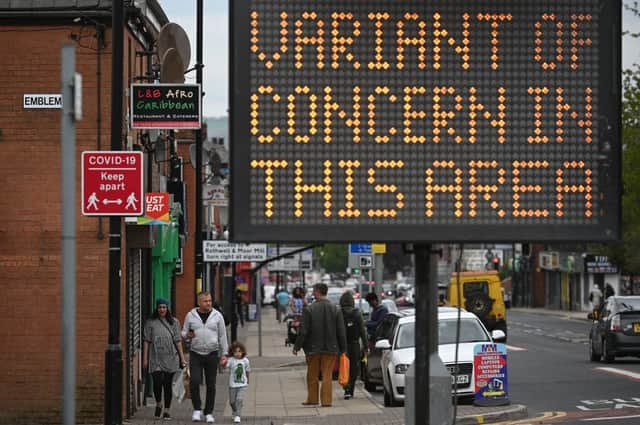Delta Covid variant is now ‘dominant in UK’ - and poses greater risk of hospitalisation


The Delta Covid-19 variant which originated in India is now thought to be dominant in the UK, as cases surge by 97 per cent.
A total of 12,431 cases of the variant of concern have been confirmed in the UK up to 2 June, according to Public Health England (PHE) - a significant increase from 6,959 in the week previous.
Increased hospital risk
Advertisement
Advertisement
Early evidence suggests that people infected with the Delta variant may be at greater risk of being admitted to hospital compared to the Alpha variant, which originated in Kent, but “more data is needed to have more confidence in that finding”.
Data from PHE shows that 278 people infected with the Delta variant visited A&E in the most recent week, with 94 of these then being admitted into hospital overnight.
This is more than double the amount of hospital admissions in the week previous, which saw 201 people attend A&E and 43 admitted to stay overnight.
PHE’s 3 June risk assessment for the Delta variant also found that coronavirus vaccines were less effective against it by comparison to the Alpha mutation.
Advertisement
Advertisement
However, figures show that more than two-thirds of people who have been infected with the Delta strain were unvaccinated.
From February 1 to May 31, there were 9,427 cases of the Delta variant recorded in England, of which 5,172 were in unvaccinated people.
Of the 137 cases that resulted in a hospital inpatient admission, just seven of those were people who had received both vaccine doses, 24 involved patients who received their first dose more than 21 days ago, and 90 were patients who had not received any dose.
Some 17 people died over the same period after contracting the variant, of which two had received both vaccine doses and 11 were unvaccinated.
Spreading across the UK
Advertisement
Advertisement
Of the 12,431 Delta variant cases confirmed so far in the UK, 10,797 of these are in England, 1,511 in Scotland, 97 in Wales and 26 in Northern Ireland.
Bolton in Greater Manchester continues to be the worst affected local area, with cases rising from 795 to 2,149, while Blackburn with Darwen in Lancashire has recorded 368 new cases, bringing its total to 724.
In Bedford there have now been 608 confirmed cases, while Leicester has recorded 349 cases, 278 cases in Manchester and 223 cases in Birmingham.
Latest data from PHE also indicated there have been 97 confirmed Covid-19 outbreaks in primary and secondary schools that have had at least one variant case linked to them over the most recent four-week period. This is the equivalent of around one in 250 schools.
Advertisement
Advertisement
While outbreaks in schools are currently at low levels, there has been a slight increase over recent weeks in line with higher levels of the Delta variant circulating in the community.
Dr Jenny Harries, chief executive of the UK Health Security Agency, said: “With this variant now dominant across the UK, it remains vital that we all continue to exercise as much caution as possible.
“The way to tackle variants is to tackle the transmission of Covid-19 as a whole. Work from home where you can, and practice ‘hands, face, space, fresh air’ at all times.
“If you are eligible and have not already done so, please come forward to be vaccinated and make sure you get your second jab. It will save lives.”